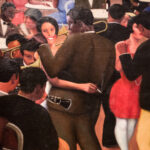“Communication is merely an exchange of information, but connection is an exchange of our
humanity.” – Sean Stephenson
The human connection is important; this is something we all know and can agree on. However,
despite the advances in technology and the explosion in popularity of social media sites—whose
advertised purpose is to draw us closer together—we live an increasingly polarized and isolated existence.
1According to a study by Harvard, 36% of Americans now feel “serious loneliness”, the effects of which
can be devastating. Not only does this sense of isolation negatively impact health and well being across
almost every physical and emotional spectrum, but it can even contribute to early mortality, according to
the study. And just like any creeping pathogen, the most vulnerable to this plague in our society is the
young and the aged.
What is the remedy? We live in a digital age of wonders, and technology has been our savior for
everything from curing boredom to driving our cars for us. We have engineered platforms to connect
people around the globe to be able to speak to each other in mere milliseconds; in what other time in
human history could a person in one continent pick up a rectangle that fits in the palm of their hand and
have a video call with a person on the other side of the planet with nary a lapse? Never, that’s when. How
can it be that we are more isolated from each other now when we are truly more able to communicate in
more ways than ever?
I learned about connection through my volunteer work in the hospice community. I began by
calling people who were diagnosed with a terminal illness to ask if there was anything they needed for the
week while they waited for their nurse’s visit. You can imagine my terror as a newly minted volunteer;
what might they say? What words might I speak to offset their dread and feelings of isolation? My panic
climbed as I dialed phone numbers, praying that each one would be sent to voice mail so that I wouldn’t
make a mistake and inadvertently worsen their situation. Just as anxiety provoking were the calls I placed
to the recently bereaved to ask how they were coping and discuss their healing process. What could I
possibly offer in the face of their abject grief? Would a meager phone call do anything to bridge an
impossibly dark chasm of loneliness?
The simple answer was yes. The phone call was reaching out, a knock at the door. It was a
question with the intent of learning more. The people I called were strangers, and oftentimes they stayed
that way. Sometimes they merely needed the transitory comfort of knowing that another soul was out
there, asking about them today, right now. That was enough. Other times the person on the end of the line
answered the phone bursting to talk, as if they’d been waiting months for someone, anyone, to call and
listen. They unburdened themselves in a rush of words, the telephone line a confessional of sorts, the
stories pouring out with tears and laughter mixed in, and at the end of all that: relief. Some people didn’t
talk much at all, but they didn’t hang up, either. I imagined them clutching at the receiver, unwilling to let
go of a lifeline, even if they weren’t quite ready to speak. But one thing everyone had in common above
all was the need to be heard, regardless of what they said or if they even said anything at all. That was the
gift I was able to give and the connection that was forged from our communication, however long it
lasted.
Communication, being heard and being connected, is vital for a meaningful human existence. In
this modern world, we have outsourced our connections to technology, but we are not the richer for it. The
people who feel this most keenly are the people who are nearing the end of their lives; they may not be
hospice patients, per se, but as our elders begin to reassess their lives, I believe that they suffer from
loneliness even more keenly than any other group, although it certainly affects us all. It is a truth that not
all of us are able to provide the worthwhile connections to our loved ones that we would prefer to, but it is
possible for them to still make essential friendships, even with someone who began as a stranger. All it
takes is a phone call.



